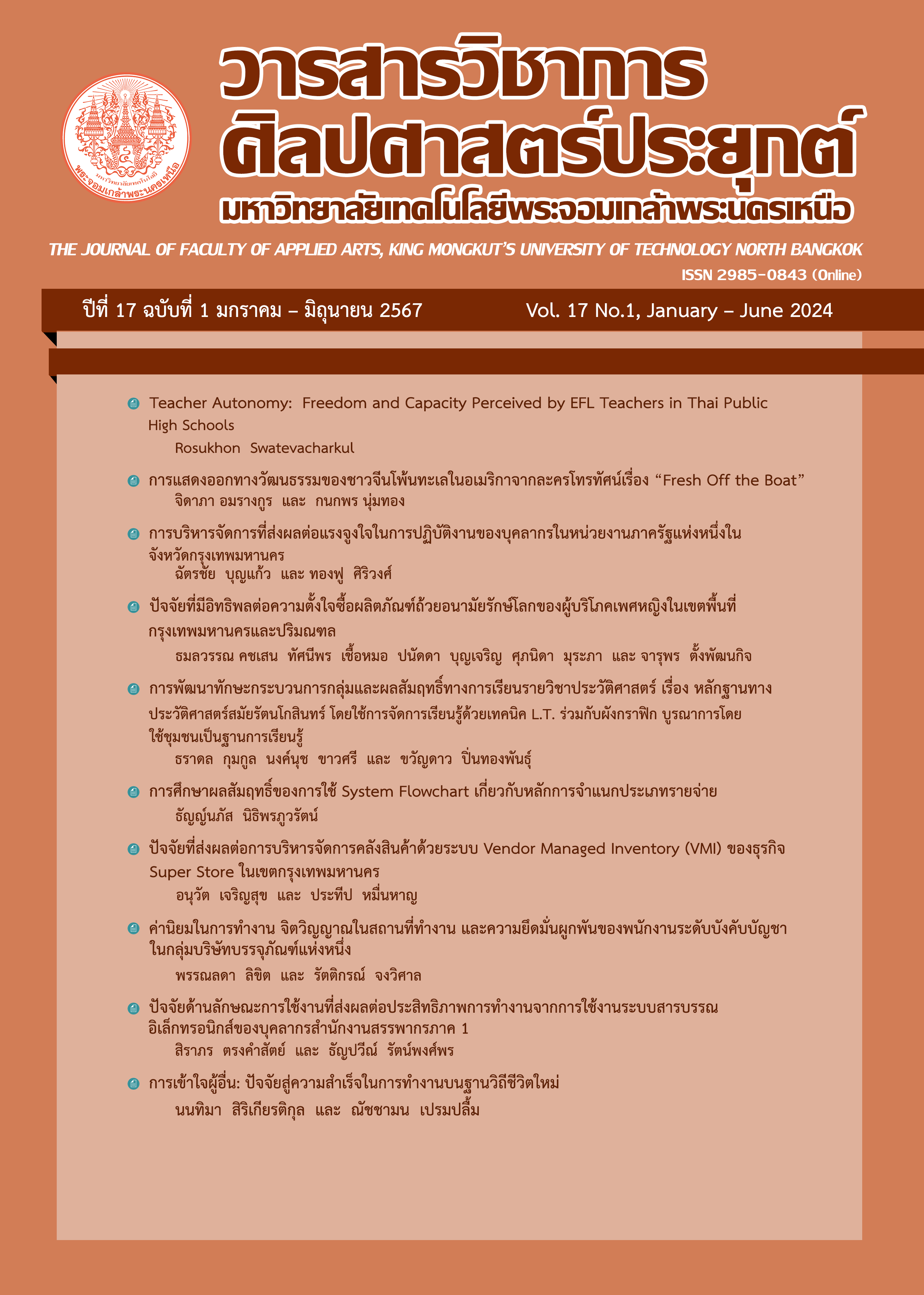ความเป็นครูผู้กำหนดตนเอง : การรับรู้อิสระและศักยภาพของครูสอนภาษาอังกฤษ เป็นภาษาต่างชาติในโรงเรียนรัฐบาลไทย
Main Article Content
บทคัดย่อ
งานวิจัยนี้ศึกษาความเป็นครูผู้กำหนดตนเองในด้านการรับรู้อิสระและศักยภาพของครูสอนภาษาอังกฤษเป็นภาษาต่างชาติในโรงเรียนรัฐบาลไทย รูปแบบงานวิจัยคือแบบขั้นตอนเชิงอธิบาย เก็บข้อมูลด้วยแบบสอบถามจากครูชาวไทยและต่างชาติรวม 29 คนที่สอนในโรงเรียนขนาดใหญ่ ตามด้วยการสัมภาษณ์แบบกึ่งโครงสร้างกับครู 6 คน ผลวิจัยแสดงว่าการรับรู้อิสระและศักยภาพของครูอยู่ในระดับสูง (ค่าเฉลี่ย 4.18 ค่าเบี่ยงเบนมาตรฐาน 0.55) และพบแก่นสาระ 5 ประการจากการวิเคราะห์สาระ คือ 1) มีอิสระสูงในการจัดการชั้นเรียนและการสนับสนุนการสอน 2) มีความสามารถสูงในการจัดการสอนของตนเอง 3) เป็นครูที่มีความสามารถรับผิดชอบการสอนด้วยตนเองในระดับปานกลางถึงสูง 4) เป็นครูที่เรียนรู้เพื่อพัฒนาตนเอง และ 5) อุปสรรคของความเป็นครูผู้กำหนดตนเอง สามารถอภิปรายผลการวิจัยได้ว่าเกิดจากการสร้างสมดุลระหว่างอิสระและศักยภาพของความเป็นครูผู้กำหนดตนเองผ่านชุมชนการเรียนรู้ทางวิชาชีพและความต้องการอย่างแรงกล้าที่จะพัฒนาวิชาชีพชึ่งก่อให้เกิดการรับรู้อิสระและศักยภาพของครูในระดับสูงนั่นเอง งานวิจัยนี้ให้ข้อเสนอแนะด้านการสอน การบริหารและงานวิจัยในอนาคต
Article Details

อนุญาตภายใต้เงื่อนไข Creative Commons Attribution-NonCommercial-NoDerivatives 4.0 International License.
1.บทความที่ตีพิมพ์เป็นลิขสิทธิ์ของวารสารวิชาการศิลปศาสตร์ประยุกต์ การนำเนื้อหา ข้อความหรือข้อคิดเห็น รูปภาพ ตาราง ของบทความไปจัดพิมพ์เผยแพร่ในรูปแบบ ต่าง ๆ เพื่อใช้ประโยชน์ในเชิงพาณิชย์ ต้องได้รับอนุญาตจากกองบรรณาธิการวารสารอย่างเป็นลายลักษณ์อักษร
2.ข้อความที่ปรากฏในบทความแต่ละเรื่อง เป็นความคิดเห็นส่วนตัวของผู้เขียนแต่ละท่านไม่เกี่ยวข้องกับวารสารวิชาการศิลปศาสตร์ประยุกต์ และบุคลากร คณาจารย์ท่านอื่น ๆ ในวารสารฯ แต่อย่างใด ความรับผิดชอบองค์ประกอบทั้งหมดของบทความแต่ละเรื่องเป็นของผู้เขียนแต่ละท่าน หากมีความผิดพลาดใด ๆ ผู้เขียนแต่ละท่านจะรับผิดชอบบทความของตนเองแต่ผู้เดียว
เอกสารอ้างอิง
Bass, B. M. & Riggio, R. E. (2008). Transformational leadership (second edition). Lawrence Erlbaum Associates,
Inc.
Benson, P. (2010). Teacher education and teacher autonomy: Creating spaces for experimentation in
secondary school English language teaching. Language Teaching Research, 14(3), 259-275.
Benson, P., & Huang, J. (2008). Autonomy in the transition from foreign language learning to foreign language
teaching. DELTA: Revista de Documentação de Estudos em Lingüística Teórica e Aplicada, 24, 421-439.
Benson, P. & Lamb, T. (2021), Autonomy in the age of multilingualism. In M. Jimenez Raya & F. Vieira (Eds.),
Autonomy in language education: Theory, research and practice (pp. 74-88). Routledge.
Breen, M. and Mann, S. (1997). Shooting arrows at the sum: perspectives on a pedagogy for autonomy. In P.
Benson & P. Voller (Eds.), Autonomy & independence in language learning (pp. 132-149). Longman.
Bureau of International Cooperation (2008). An introduction to education in Thailand. Retrieved from
Chinpakdee, M. (2022). Understanding teacher autonomy through EFL teachers’ online teaching experiences.
rEFLections, 29(3), 586-602.
Cirocki, A., & Anam, S. U. (2021). How much freedom do we have? The perceived autonomy of secondary
school EFL teachers in Indonesia. Language Teaching Research, 1-26. Retrieved from https://doi:10.1177/13621688211007472.
Creswell, J. W., Plano Clark, V., Gutmann, M., & Hanson, W. (2003). Advanced mixed methods research
designs. In A. Tashakkori and C. Teddle (Eds.), Handbook of mixed methods in social and behavioral research (pp. 209-240). Sage Publications.
Derakhshan, A. & Taghizadeh, M. (2020). Investigating the role of English language teachers’ professional
identity and autonomy in their success. Retrieved from
https://researchgate.net/publication/342004335.
Dincer, A. (2019). Language teacher autonomy in Turkish EFL context: Relations with teachers' autonomy and
job satisfaction levels. i-manager’s Journal on English Language Teaching, 9(2), 11-25.
Huang, J. (2005). Teacher autonomy in language learning: A review of the research. Research Studies in
Education, 3, 203-248.
Farrell, T.S.C. (2015). Promoting teacher reflection in second language education. Routledge.
Farrell, T.S.C. (2022). Insights into professional development in language teaching. Castledown.
Jeh-Awae, V., & Wiriyakarun, P. (2021). Effects of self-efficacy and teacher autonomy on Thai EFL pre-service
teachers’ online teaching practices during COVID-19 pandemic: doi:10.14456/jlapsu.2021.5. Journal of Liberal Arts Prince of Songkla University, 13(2), 89–119. Retrieved from https://so03.tci-thaijo.org/index.php/journal-la/article/view/254284
Jimenez Raya, M. (2017). Teacher autonomy and agency. In Jimenez Raya, M., Martos Ramos, J. J., & Tassinari,
M. G. (Eds.). Learner and teacher autonomy in higher education: Perspectives from modern language
teaching (pp. 15-32). Peter Lang GmbH.
Khemavamsa, A. (2022). A study of the level of teacher autonomy and its constraints perceived by English
language teachers at an international university in Bangkok, Thailand. (Master's thesis, Assumption
University).
Lai, C. (2023). Insights into autonomy and technology in language teaching. Castledown.
Little, D. (1995). Learning as dialogue: the dependence of learner autonomy on teacher. System, 3(2): 175-181.
McGrath, I. (2000). Teacher autonomy. In Sinclair, B., McGrath, I., & Lamb, T. (Eds.), Learner autonomy,
teacher autonomy: Future directions (pp. 100-110). Longman.
Murray, N., Zhen, G., & Mosavian, P. (2020). Constraints on innovation in English language teaching in
hinterland regions of China. Language Teaching Research, 1-22. Retrieved from http://doi.org/10.1177/1362168820979855
Paulsrud, D., & Wermke, W. (2020). Decision-making in context: Swedish and Finnish teachers’ perceptions of
autonomy. Scandinavian Journal of Educational Research, 64(5), 706–727. Retrieved from https://doi.org/10.1080/00313831.2019.1596975
Pearson, L. C. & Moomaw, W. (2005). The relationship between teacher autonomy and stress, work
satisfaction, empowerment, and professionalism. Educational Research Quarterly, 29.1, 38-53.
Smith, R. & Erdogan, S. (2008). Teacher-learner autonomy: Programme goals and student-teacher constructs.
In T. Lamb & H. Reinders (Eds.), Learner and teacher autonomy: Concepts, realities, and responses (pp. 83-102). John Benjamins Publishing Company.
Stoll, L., Bolam, R., McMahon, A. et al. (2006). Professional Learning Communities: A Review of the Literature. J Educ Change, 7, 221–258. Retrieved from https://doi.org/10.1007/s10833-006-0001-8
Swatevacharkul, R. (2022). Perceptions of Thai EFL teachers at public schools in Nonthaburi, Thailand: Teacher
autonomy and constraints. RJES, 9(2), 42-59.
Usma Wilches, J. (2007). Teacher autonomy: A critical review of the research and concept beyond applied
linguistics. Íkala, revista de lenguaje y cultura, 12(18), 245-275.
Vieira, F. (2003). Addressing constraints on autonomy in school contexts: Lessons from working with teachers.
In D. Palfreyman & R.C. Smith (Eds.), Learner autonomy across cultures: Language education
perspectives (pp. 220-239). Palgrave Macmillan.
Worth, J. & Van den Brande, J. (2020). Teacher autonomy: How does it relate to job satisfaction and
retention? NFER.
Yazici, A. S. (2016). The relationship between the teacher autonomy and learner autonomy support behaviors.
Journal of educational Sciences Research, 6(2), 1-23.
Zhang, D, He, J & Fu, D. (2021). How can we improve teacher’s work engagement? Based on Chinese
experiences. Frontier in Psychology, 12, 1-12 doi: 10.3389/fpsyg.2021.721450


